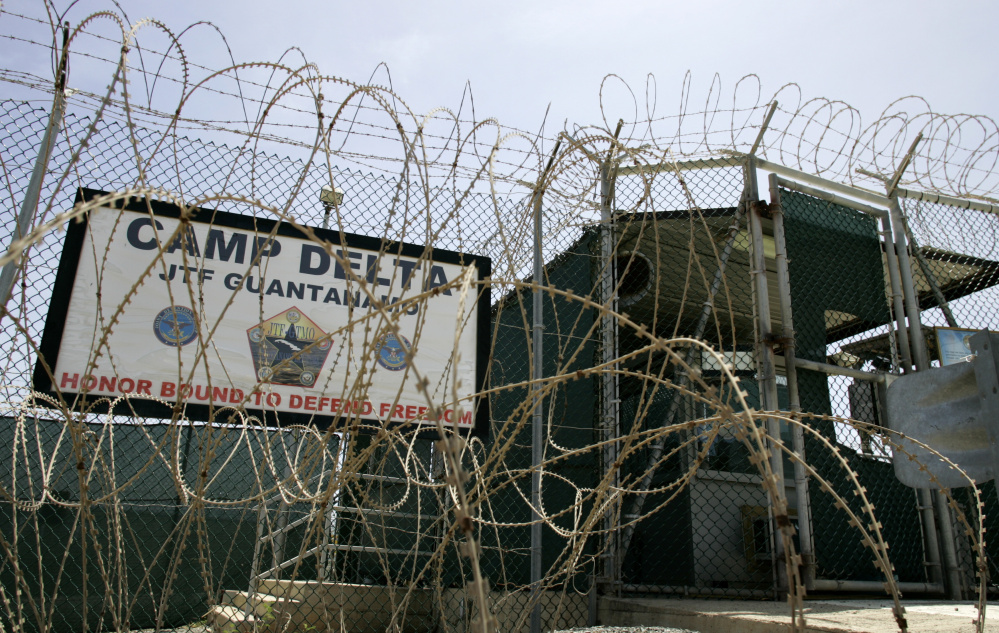WASHINGTON — The Obama administration withheld from Congress the names of 10 potential mainland U.S. sites to house detainees now at the Guantanamo Bay prison out of concern that the disclosure would exacerbate political disputes over closing the facility in Cuba.
The administration said this week that it had compiled a list of 13 potential replacements for the Guantanamo Bay detention facility, set up to hold suspected terrorists after the Sept. 11 attacks, if lawmakers agreed to shut it. But with the exception of three sites the Pentagon already acknowledged inspecting – military bases in South Carolina and Kansas and a federal supermax prison in Colorado – the White House refused to identify the locations publicly or in a report sent to Congress.
The decision underscores the difficult political realities associated with closing the prison in Cuba, which President Obama has long decried as too expensive to maintain and a recruitment tool for terrorist organizations. Congress required Obama to submit a plan to close the prison in a November law, even as most Republicans and many Democrats refuse to consider transferring detainees to the mainland.
“I have pledged to give the president’s plan a fair hearing, but he makes it impossible to do so when he withholds critical details,” House Armed Services Committee Chairman Mac Thornberry, a Texas Republican, said in a statement.
An administration official, seeking anonynmity, said that the report left 10 of the alternative facilities unnamed because the administration didn’t want to spark a debate over the merits and shortcomings of any particular location.
Instead, the official said, the administration hopes preliminary estimates of how much an alternative mainland prison will cost can spur a dialogue with Congress over closing Guantanamo. Site selection would come later.
U.S. officials say housing the detainees on the mainland would cost $65 million to $85 million less per year than at the U.S. naval base at Guantanamo Bay.
Even lawmakers who support shutting the prison are wary of the possibility that detainees could be transferred to prisons in their home districts or states. Sen. Michael Bennet, a Colorado Democrat seeking re-election this year, has said Guantanamo detainees shouldn’t be moved to civilian prisons in his state, including the supermax in Florence, Colo., that already houses some convicted terrorists.
Critics of the president’s plan to move prisoners to the U.S. say they fear a mainland site could become a target for terrorist attacks or mass demonstrations. A 2009 effort to transfer Khalid Sheikh Mohammed, the self-described mastermind of the Sept. 11 terrorist attacks, from a Guantanamo tribunal to federal court in New York fizzled after opposition from Congress and New York City officials worried about security. A proposal to buy a prison in Illinois for Guantanamo prisoners was abandoned after it produced an uproar in the president’s home state.
The decision to withhold the full list was roundly criticized by Republicans on Capitol Hill, who say that without specific alternative prisons Obama’s plan is impossible to evaluate. Republicans also contend that withholding the names of the sites violates the law that required Obama to submit a plan.
The White House says Congress has made it impossible to choose a replacement for the Guantanamo prison.
A provision of the November law requiring Obama to submit a plan to close the prison prohibits the use of tax dollars to “construct or modify any facility in the United States” to house detainees transferred from Guantanamo. The Obama administration believes that prevents the Pentagon from conducting any detailed evaluation of alternative sites. A provision of a separate law passed in December prohibits the use of tax dollars to “assist in the transfer or release” of Guantanamo detainees.
The restrictions are “yet another example of congressional dysfunction that they have written a law that includes varying guidance,” White House Press Secretary Josh Earnest said.
House Republicans have flatly rejected the administration’s interpretation of the law.
Send questions/comments to the editors.



Success. Please wait for the page to reload. If the page does not reload within 5 seconds, please refresh the page.
Enter your email and password to access comments.
Hi, to comment on stories you must . This profile is in addition to your subscription and website login.
Already have a commenting profile? .
Invalid username/password.
Please check your email to confirm and complete your registration.
Only subscribers are eligible to post comments. Please subscribe or login first for digital access. Here’s why.
Use the form below to reset your password. When you've submitted your account email, we will send an email with a reset code.